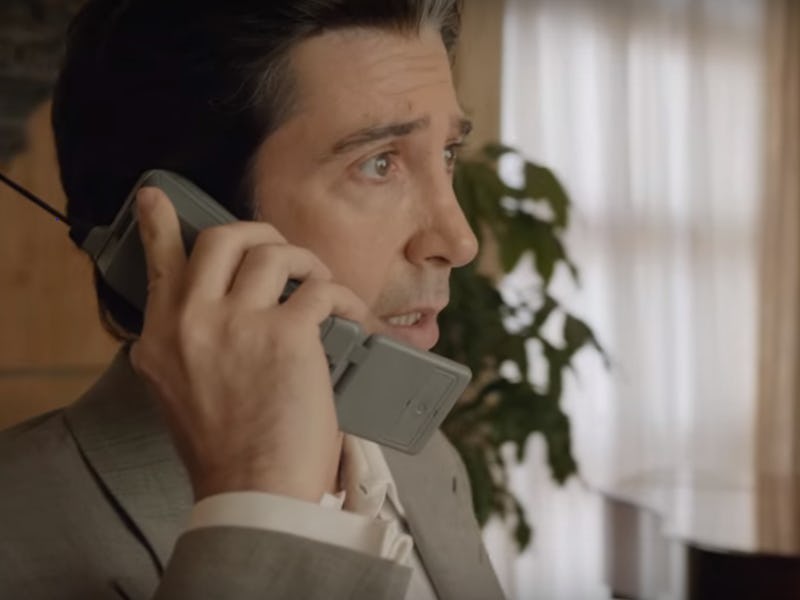Exploring the Grief of Robert Kardashian on 'American Crime Story'
Is David Schwimmer's O.J. worshipper a clown or a sympathetic moral compass? Episode 2 points both ways.

The fact that David Schwimmer was cast at Robert Kardashian in a new, largely straightforward drama about the O.J. Simpson trial has been a source of excitement, disbelief and unintentional humor — sometimes all at once. We can’t pretend that Ryan Murphy, who loves this sort of winking, pop-culture-attuned skullduggery, isn’t aware of that fact. Alongside John Travolta as Robert Shapiro, Murphy and showrunners Scott Alexander and Larry Karaszewski’s warped take on O.J.’s defense team becomes a complicated thing to process.
Should we be moved, dramatically riveted, or laughing? On one hand, you have characters saying and doing deathly serious things, but then there is Travolta with crooked eyebrows — blasting smooth fusion in his sedan, suitably pompous beyond measure in all interactions. Travolta, as an actor, is odd on another level — spirited but dead-eyed. With these characters, the intersection between straight-faced dramatic lines, situational humor, and incidental, extra-textual humor makes for a uniquely odd, Murphy-ish package. All of it comes in the context of a (largely) straightforward crime drama.
The Schwimmer effect is a bit more complicated than the Travolta one, in a way that makes his Robert Kardashian strangely dramatically powerful. The Ross Geller overtones play a more integral role than you might think. For as much as Robert scans like a “golden heart” and hero — the man whose compassion and faith is big enough to give O.J. the benefit of the doubt, and stand by him unconditionally — his visceral, melodramatic reactions read as a sendup of a certain type of comical, knee-jerk, distinctly American (or Hollywood-y) piousness.
The show’s second episode begins with Kardashian intoning prayer breathlessly in the lavish bathroom of the Simpson family’s house in Brentwood. We learn soon afterward that this is because he’s immediately assumed that O.J. is dead, following his escape. He takes Simpson’s overly dramatic note (signed, as Shapiro points out, with a smiley face) at face value. His faith — or simply the idea of being a trusting, faithful man — came before critical thinking here, as it no doubt will in the future. How unflinching can his devotion to nebulous concepts and ideas of people be? Is his “golden heart” nature the result of a slight dimness?
There’s an implication that Kardashian’s worship of OJ extends beyond the normal realm of devotion to a best friend. Kardashian, at this point, is not a famous man; O.J. is his famous friend, as well as his best one. Simpson is a man Robert views as “great,” and esteems also for the impact he has made as a cultural “icon.” The nature of this impact, of course, is thrown into question by attorney Christopher Darden in the episode: “O.J. never gave back. … He became white.” But to Kardashian, “he’s still the Juice,” as he exclaims, meaninglessly, in the pilot. What people like O.J. build should — to the fickle, vaguely aspirational Schwimmer-Kardashian — be considered immutable. But what has O.J. built? What did Kardashian fall in love with? What has he really placed his faith in?
In last night’s episode, we see Courtney B. Vance’s Johnnie Cochran watch Robert Shapiro’s self-aggrandizing press conference, commenting that Shapiro keeps falling back on “me, myself, and I.” Cochran warns his employees to make plays that are in service of only their clients in their cases. Bad lawyers make these things about themselves, Cochran warns. If a defendant has to firm up their version of events until it ossifies to win, lawyers have to find some steadfast “truth” to grasp onto, and define themselves around. They have to inhabit a character.
One gets the feeling that Kardashian, too, is making the situation about himself. His overpowering, sorrowful outbursts — the image of him screaming and crying in his car, his choked-up tone in every scene — give us the feeling that his unraveling is not simply about his friend, but about the ideal that his friend represented to him. This friendship was what he had defined himself around. The unsullied O.J. made Kardashian feel a certain level of importance. But no doubt, in the episodes to come, Kardashian will find new self-definition and importance as a (under-qualified) part of one of the most notorious defense teams in legal history.
Kardashian’s blind faith — demonstrated in all of his scenes on the show thus far — manages to make his character at once a sympathetic hero and a buffoon. In some sense, we don’t know where his haplessness will lead him yet — though in a macro, narrative sense we do. For now, we are forced to remain as confused or deluded about who Robert Kardashian is, and what he believes in, as he himself is.